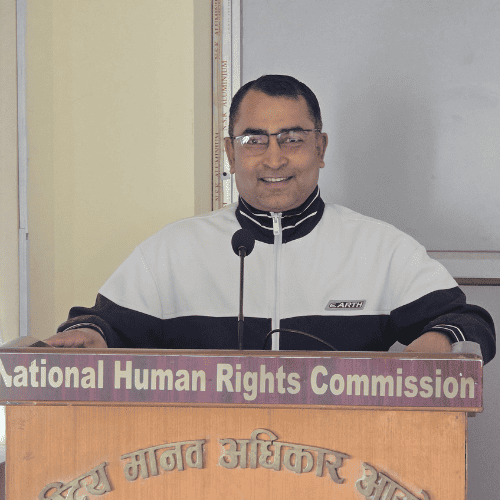
Kamal Thapa Kshetri is the Under Secretary and Head of the International Relations Division, Migration and Refugee at the National Human Rights Commission (NHRC) of Nepal. Before joining the NHRC Kamal practiced law as an advocate, and developed his expertise in constitutional and human rights law. He has completed LLM in Human Rights and Gender Justice.
At the NHRC, Kamal has focused on the human rights of Nepal’s migrants, and victims of human trafficking. He has promoted policy reform for safe migration and to prevent human trafficking. This is one of Nepal’s critical human rights challenges, as so many of its young women and men leave the country in search of decent work, to send money home to their families. Their remittances make up almost 26.3 % of Nepal’s GDP..
“I have been part of every trafficking in persons (TIP) report since 2005, and Human Rights Situation of Migrant Workers contributing to policy changes, protection issues of trafficking and safe, orderly and regular migration and raising awareness about the vulnerabilities of Nepalese migrant workers.”
Many of Nepal’s migrant workers go to the countries of the Gulf – Saudi Arabia, Kuwait, UAE, Bahrain and Qatar. Many experience exploitation and abuse.
In 2016, Kamal participated in the Diplomacy Training Program (DTP) in Qatar, which he credits as a turning point in his advocacy career.
“DTP was a foundation for me. It broadened my understanding of migrant rights and gave me the tools to advocate more effectively… I had the opportunity to interact with human rights defenders from various countries and discuss challenges facing migrant workers globally. The training helped me see how interconnected our struggles are.”
Kamal says that DTP reinforced his belief that human rights protections should not stop at national borders. To protect migrant rights, action is needed in countries of origin and destination – and along the migration corridors.
Following the training, Kamal led initiatives to strengthen the NHRC’s engagement with National Human Rights Commissions in the destination countries – signing MoUs with Qatar, Malaysia and collaboration with NHRC India, Indonesia and Philippines. In his experience the protection of migrant workers can be effective by collaboration with cross border NHRIs. This cooperation significantly does make sense towards the protection of rights of migrant workers. Government should simply facilitate to safe orderly and regular migration rather than impose procedural hurdles.
Kamal’s journey into human rights advocacy began in 2005 when Nepal was experiencing political turmoil and internal armed conflict.
“During that time, there were numerous human rights violations—killings, torture, enforced disappearances, and political suppression. I was motivated to protect and promote the rights of my fellow Nepalese and contribute to justice.”
Kamal envisions a Nepal where human rights are not just constitutional guarantees but are actively upheld through political commitment and resource allocation.
“Economic, social, and cultural rights require structural support and investment. If there is political will, Nepal can create employment opportunities and reduce its dependency on foreign labor migration.”
While he remains cautiously optimistic, Kamal continues to advocate for stronger protections of migrant workers.
“DTP reinforced my commitment to ensuring justice for migrant workers. The struggle is ongoing, but every step forward counts.”
DTP acknowledges the traditional custodians of the land on which we work, the Bedegal people of the Eora Nation. We recognise their lands were never ceded, and we acknowledge their struggles for recognition and rights and pay our respects to the Elders – past, present – and the youth who are working towards a brighter tomorrow. This continent always was and always will be Aboriginal land.
Aboriginal and Torres Strait Islander peoples should be aware that this website contains images or names of people who have passed away.
DTP acknowledges the traditional custodians of the land on which we work, the Bedegal people of the Eora Nation. We recognise their lands were never ceded, and we acknowledge their struggles for recognition and rights and pay our respects to the Elders – past, present – and the youth who are working towards a brighter tomorrow. This continent always was and always will be Aboriginal land.
Aboriginal and Torres Strait Islander peoples should be aware that this website contains images or names of people who have passed away.
Privacy Policy | Terms of Use | Disclaimer | Policies
© 2022 Diplomacy Training Program | ABN 31 003 925 148 | Web Design by Studio Clvr